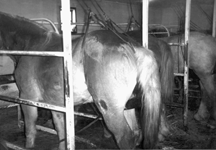
World Society for the Protection of Animals (WSPA)
Horse Cents: After their foals are taken away, mares at a Premarin farm spend life standing in a small stall hooked up to a catheter.
Millions of women are taking estrogen made from horse urine, in a process two animal rights groups claim is cruel and inhumane
By Laura Stuchinsky
In a battery of hastily made phone calls and faxed press releases last month, People for the Ethical Treatment of Animals promised a foal--presumably a real, live baby horse balancing on spindly little legs in front of Longs Drug Store on Branham Lane.
There, the animal rights group said, it planned to stage a protest against the cruel way pregnant mares and their offspring are treated in the manufacture of the estrogen drug Premarin, currently taken by millions of postmenopausal women.
But a pounding rainstorm trapped the activists under the Longs awning, out of reach of Carl's Jr. and An-Jan's patrons. And only a trickle of shoppers dashed into the drugstore, politely accepting the activists' damp leaflets en route.
No one from the media, with their publicity-generating cameras, ever did show up. And PETA's "foal" was merely a man in costume.
The fact is, a newborn horse is not that easy to come by, unless you run the horse farms that produce the pregnant mare urine from which Premarin is extracted. In that case, you have thousands of foals. Foals that have fulfilled their purpose to generate hormones in their mother's urine. Foals that can be sold for riding, racing or food to the highest bidder on the international market.
That's the point PETA wanted to make, that baby horses are being routinely sold and killed, that mares are living a tortured existence in the name of producing a profitable drug, while a viable, vegetable-based alternative exists.
Thirty percent of post-menopausal women in the United States--approximately 10 million women--take some kind of estrogen to replace the hormone their bodies no longer produce. Currently, five postmenopausal estrogens approved by the Food and Drug Administration share the market with Premarin. But most prescriptions--80 percent--are written for the drug derived from horse urine.
As with its battles against fur farms, laboratory animals and circuses, PETA sent undercover agents to spy on Premarin farms in North Dakota and Canada two years ago. Their operatives returned with videotapes and horror stories of practices on the farms. But the accusations of the animal rights organization gained momentum when another animal welfare organization made similar charges earlier this year.
Joe Silva, shelter director for the Massachusetts Society for the Prevention of Cruelty Against Animals, says he was "floored" by what he saw on an inspection of 32 Premarin urine farms last February: mares tied into four-feet-by-eight-feet stalls so small they couldn't turn around, some on such short halters they couldn't lie down. Horses confined to stables for the six months their urine is collected with little or no exercise. Rare or no veterinary care. An automated water distribution system that limits how much and when the horses can drink. Each time the system clicks on, Silva says, the mares started kicking frantically, injuring themselves and their neighbors.
Silva, who grew up on a horse farm and holds a degree in dairy science and farm management, represented the World Society for the Prevention of Cruelty Against Animals, one of a dozen animal welfare organizations from Canada, the United States and the United Kingdom invited on the tour. Although many of the organizations made the same observations as Silva, the shelter director's conclusions were harsher.
"They're basically cow barns," Silva says of the Premarin farms: production lines where farmers collect urine rather than milk. But cows are different from horses, he argues. It's not that the farmers are deliberately cruel, he says, but the system's design "doesn't meet the behavioral needs of a horse."
Silva says farmers told him that many of the mares would "just quit standing" after eight or nine years, when normally horses can last 20 years or longer.
"We're really concerned about the mares," Silva says. "If they were in any state in New England, they'd be breaking the law."

World Society for the Protection of Animals
Face Facts: One farmer reported that Premarin horses "quit standing" after eight or nine years, instead of the 20 years lived by most horses.
"There's not as many problems as some people would have you believe," counters Nat Messer, a longtime horse veterinarian and chairman of the Equine Welfare Committee of the American Association of Equine Practitioners. Silva, Messer notes, is not a veterinarian.
There's no question the horses are being kept in an unconventional way, Messer acknowledges. But there's no evidence that small stalls, standing for lengthy periods, minimal exercise and controlling a horse's access to water is harmful, he argues.
"No one knows that horses need more exercise than they're getting," Messer says. "Yes, [the mares] were kept in for great periods, but they appeared content. They weren't ill. There were no signs of infectious diseases."
If some horses don't last 20 years, it's probably because some kinds of horses don't do as well on a production line, not because they're treated poorly, Messer says.
The veterinarian takes a equally utilitarian view on foals being sold for meat. Although the number of foals sold to slaughterhouses is a matter of dispute, PETA, which advocates a vegetarian diet, has trumpeted the foals' plight as a key issue in their campaign.
"It's not for you and I to decide whether it's appropriate to eat horsemeat," Messer counters. "There's a market for it."
So long as the company makes changes recommended by the Equine Association--such as instituting regular veterinary inspections, redesigning the stalls so the horses can lie down, and investigating and implementing its findings regarding the effect of restricting water and exercise to pregnant mares--Messer says in his view the horses are being treated humanely.
Fifty years ago, when estrogen's value was first discovered, pregnant horse urine was the cheapest and most accessible source, explains Los Gatos gynecologist Phillip Warner. But the hormones produced by horses differ from those of humans.
Over time, scientists found ways of extracting estrogen from plants such as yams and soybeans and ultimately devised ways of synthesizing a precise duplicate of human estrogen. Today, Warner says, Premarin is an "anachronism. It's a throwback. It's like using the Teletype instead of a fax."
Many medical experts, such as Warner, director of the Menopause Institute of Northern California, would like to see more estrogen use, because of the drug's many supposed benefits. Estrogen appears to prevent osteoporosis. It may also reduce coronary heart disease, colon cancer, and possibly Alzheimer's disease.
But if women are going to take estrogen, the gynocologist argues, it makes more sense for them to take a formulation that replaces exactly what they've lost. That's why, Warner says, he no longer prescribes Premarin for his patients.
PETA has latched onto Warner's arguments to bolster its own against Premarin. But the main thrust of PETA's complaint is the way the drug is produced.
According to a Wyeth-Ayerst spokesperson, the company has already implemented many of the recommendations made by the equine association, including hiring a veterinarian, increasing the frequency of farm inspections, and instituting a breeding improvement program to increase the value of the foals and, as a result, reduce the odds of their being sold for meat.
Norm Luba, spokesperson for the North American Equine Ranching Information Council, says the company has also completed a study on the effect of water rationing and found that regulating a pregnant mare's access to water is not harmful. The next study will be on exercise.
It's possible that Wyeth-Ayerst has improved conditions on its farms in the year since his visit, says Silva. But he says the company remains tight-lipped. The World Society for the Protection of Animals asked to revisit the farms, but the pharmaceutical giant refused the request. Silva says they've also been denied access to inspector's reports. Messer claims he's been invited to return, but hasn't as yet.
"We're not in the tour guide business," Wyeth-Ayerst spokesperson Audrey Ashby says in the company's defense. "Our position is that [the World Society's] position is not supported by the evidence."
But as far as PETA is concerned, so long as alternatives exist, there's no reason for women to use Premarin.
"We see [Premarin] as unnecessary, even if the mares were all treated well and the foals were all placed," says Megan Patterson, PETA's Premarin campaign coordinator. "Nobody wants to go out of their way to be cruel, especially when there's an alternative."
[ Metro | Metroactive Central | Archives ]
